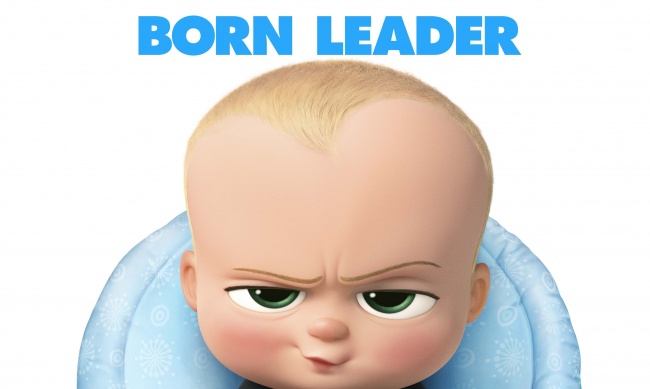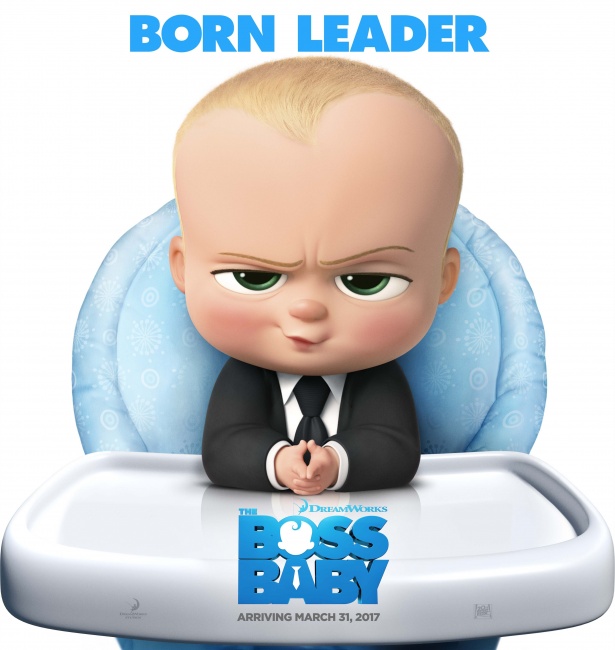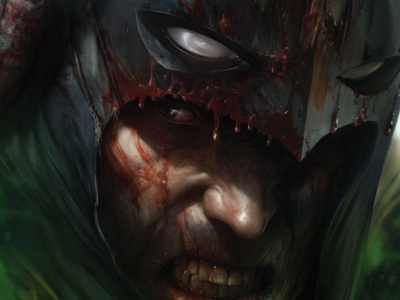In a weekend during which the movie box office took a bit of a break before the impending release of the certified blockbuster Fast and Furious 8 (also known as The Fate of the Furious), Dreamworks Animation’s animated holdover Boss Baby easily demolished its direct competition, the new animated Smurfs movie, and narrowly eked out a win over Disney’s live-action Beauty and the Beast, 2017’s biggest box office release so far, which is certain to cross the $1 billion mark later this week. Overall the box office was down about 7% from the same weekend last year, when Warner Bros.’ Batman v. Superman: Dawn of Justice held the top spot for a second weekend in a row in spite of a precipitous drop of 70% from week one to week two.
Boss Baby, which features the voice of Trump impersonator Alec Baldwin in the title role, slipped just 48% in its second frame as it earned an estimated $26.3 million for a 10-day domestic total of $89.4 million. Overseas Boss Baby has earned $110.4 million, which pushed its global total to almost $200 million. While it is off to a good start, Boss Baby will need to demonstrate strong “legs” over the next month, if Dreamworks and Fox are contemplating turning the clichéd IP (about a baby who “talks” like a hardened businessman) into a franchise.
Meanwhile Disney’s live action Beauty and the Beast finally appears to be slowing down, though not before becoming 2017’s #1 film so far with a domestic total of $432.3 million, and a worldwide haul certain to pass the $1 billion mark later this week. Given Disney’s penchant for leaving its hit films in theaters for as long as possible, a $500 million domestic run remains a distinct possibility, especially given the modest 45% drop that the movie endured in its fourth weekend in theaters as it collected an estimated $25 million. Will it retain its #1 spot in the 2017 domestic market for long? That will depend on how 2017’s other potential blockbusters fare—and the first film with the franchise track record to challenge Beauty, Universal’s The Fate of the Furious will debut next weekend.
Sony has largely missed out on the boom in animated feature, but back in 2011 the studio gambled on a live-action/animated hybrid film featuring Belgian comic artist Peyo’s little blue creatures, The Smurfs. The first Smurfs film took in a healthy $563.7 million, but a second live-action/animated hybrid Smurfs movie in 2013 could manage only $347.5 million. Now comes the debut of Sony’s third Smurf movie, Smurfs: The Lost Village, a fully animated feature that debuted with just $14 million, one of the worst bows in recent times for an animated film released by a major studio.
Yes, the competition from the “family-friendly” Boss Baby and Beauty and the Beast was ferocious, but the trend line for the Smurfs franchise is all too evident, and it is hard to see how the franchise will continue, unless Smurfs: The Lost Village, which cost $60 million to produce, does exceptionally well overseas. Opening weekend audiences did give The Lost Village a solid “A” CinemaScore, which is marginally better than the (A-) ratings the first two Smurf movie received, so perhaps there is some hope for “word of mouth,” though it is starting from a very small base.
While Smurfs: The Lost Village underperformed expectations, the opposite was true for the geezer heist comedy remake Going in Style directed by Zach Braff and starring Morgan Freeman, Michael Caine, and Alan Arkin in roles originally played in 1979 by George Burns, Art Carney, and Lee Strasberg. Theordore Melfi updated the 1979 script by making the bank that the trio robs the real “villain” of the piece, since it purchased the company the men worked for and then “restructured” their pensions out of existence. This populist gloss on the original story was largely overlooked by critics, who gave the film only a 44% positive rating on review aggregator Rotten Tomatoes, but audiences evidently responded as the film earned an estimated $12.5 million, well over the $7-8 million that many box office analysts had been predicting.
Audiences for Going in Style skewed female (53%) and, as might be expected, older (90% over 35), and they gave the film an OK “B+” CinemaScore, which could translate to a modicum of counter-programming success with older audiences over the next few weeks.
Fifth place went to another remake, Paramount’s anime/manga-based live-action Ghost in the Shell, which tumbled 60.6% in its second weekend as it earned an estimated $7.35 million to bring its domestic total to $31.6 million. The Scarlett Johansson-starring cyber-thriller is doing better overseas, where it has earned $92.8 million, but in spite of a major ad campaign in Japan, the film was only able to earn $3.2 million, and its China debut ($21.4 million) was OK, but not of the magnitude that the $110 million production will need to break even.
Lionsgate’s Power Rangers, another attempt to create a franchise out of a 1990s kid TV series, got off to a solid start, but has faltered. Now in its third weekend in theaters, the “super-sentai-based” teen superhero epic fell 56.2% as it earned $6.2 million to bring its domestic total to $75.1 million. Earning more than $100 million here in North America now seems a difficult task, putting the fate of yet another potential franchise in danger.
Spots seven-through-nine this weekend were occupied by a trio of films that can be classified as “hits,” though Kong: Skull Island, which has earned $156.6 million here and $377.8 million overseas, is probably only marginally profitable so far given its enormous $185 million production cost.
Considerably more profitable is Fox’s final Wolverine film starring Hugh Jackman, the R-rated Logan, which dropped just 33.7% in its sixth weekend in theaters. Logan added $4 million this weekend, driving its domestic total to $218 million, and its global haul to almost $600 million versus a cost of just $97 million.
Even better from a cost-to-earnings perspective is the performance of Jordan Peele’s socially-conscious horror film Get Out, which has now earned $162.9 million versus a cost of just $4.5 million.
The final spot in the top ten went to the religiously-themed The Case for Christ, which earned $3.9 million from just 1,174 theaters. With an “A+” CinemaScore from audiences, The Case for Christ could hang around the bottom half of the top ten for quite some time.
Also of interest is the performance of Makoto Shinkai’s anime feature Your Name, which is being released here by Funimation, and which earned $1.6 million from just 303 theaters for a solid $5,281 per theater average (which was better than all but the top two films in the top ten). Your Name is no ordinary anime feature. It has earned $328.9 million overseas including $214.8 million in Japan and $83.7 million in China. Your Name has a sterling 97% positive rating on review aggregator Rotten Tomatoes and almost as high a rating from audiences. It appears set for a solid “art house” run here in the States, but could possibly do a bit better, if things fall right.
Next weekend The Fate of the Furious, which most analysts expect will become 2017’s second film to debut over $100 million, will bow in an April record 4,200 theaters. Be sure to check back here next week to see what films are left standing after the auto-fueled onslaught of The Fate of the Furious.

Makoto Shinkai's Anime Masterpiece 'Your Name' Strong in Limited Release
Posted by Tom Flinn on April 9, 2017 @ 1:38 pm CT
MORE COMICS
From Dynamite Entertainment
August 8, 2025
Here's a preview of Space Ghost #1, published by Dynamite Entertainment.
Dark, Erotic Manga Based on Short Story by Edogawa Rampo
August 8, 2025
Maruo brings his signature “erotic grotesque” style to a dark tale by writer Edogawa Rampo.
MORE COLUMNS
Column by Jeffrey Dohm-Sanchez
August 7, 2025
ICv2 Managing Editor Jeffrey Dohm-Sanchez lays out the hotness of Gen Con 2025.
Column by Rob Salkowitz
August 5, 2025
In this week's column by Rob Salkowitz, he looks at the industry's biggest show, held in the midst of some existential issues.








